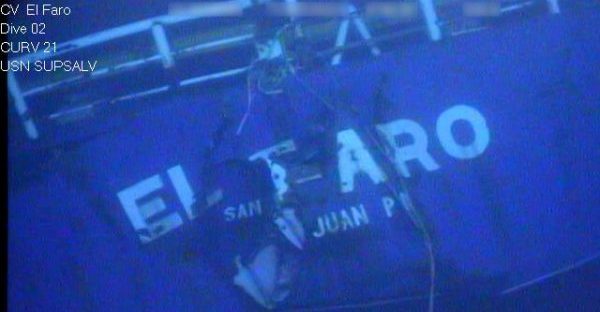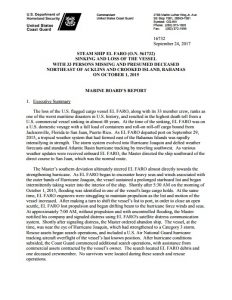The US Coast Guard issued an official investigation report on cargo vessel El Faro, which sank along with its 33 member crew, in October 2015, becoming one of the worst maritime disasters in US history. The investigation report on El Faro cargo vessel found that the captain underestimated the strength of a hurricane and overestimated the ship’s strength on a trip between Florida and Puerto Rico. Also, ship’s owner, Tote Maritime Inc., had not replaced a safety officer and had violated regulations regarding crew rest periods and working hours.
The incident
At the time of the sinking, EL FARO was on a U.S. domestic voyage with a full load of containers and roll-on roll-off cargo bound from Jacksonville, Florida to San Juan, Puerto Rico.
As EL FARO departed port on September 29, 2015, a tropical weather system that had formed east of the Bahamas Islands was rapidly intensifying in strength. The storm system evolved into Hurricane Joaquin and defied weather forecasts and standard Atlantic Basin hurricane tracking by traveling southwest. As various weather updates were received onboard EL FARO, the Master directed the ship southward of the direct course to San Juan, which was the normal route.
The Master’s southern deviation ultimately steered EL FARO almost directly towards the strengthening hurricane. As EL FARO began to encounter heavy seas and winds associated with the outer bands of Hurricane Joaquin, the vessel sustained a prolonged starboard list and began intermittently taking water into the interior of the ship. Shortly after 5:30 AM on the morning of October 1, 2015, flooding was identified in one of the vessel’s large cargo holds. At the same time, EL FARO engineers were struggling to maintain propulsion as the list and motion of the vessel increased. After making a turn to shift the vessel’s list to port, in order to close an open scuttle, EL FARO lost propulsion and began drifting beam to the hurricane force winds and seas.
At approximately 7:00 AM, without propulsion and with uncontrolled flooding, the Master notified his company and signaled distress using EL FARO’s satellite distress communication system. Shortly after signaling distress, the Master ordered abandon ship. The vessel, at the time, was near the eye of Hurricane Joaquin, which had strengthened to a Category 3 storm. Rescue assets began search operations, and included a U.S. Air National Guard hurricane tracking aircraft overflight of the vessel’s last known position. After hurricane conditions subsided, the Coast Guard commenced additional search operations, with assistance from commercial assets contracted by the vessel’s owner. The search located EL FARO debris and one deceased crewmember. No survivors were located during these search and rescue operations.
Conclusions – Probable Causes
Recommendations
Among others, it is recommended that Commandant direct a regulatory initiative:
- to review U.S. regulations, international conventions, and technical policy to initiate revisions to ensure that all ventilators or other hull openings, which cannot be closed watertight or are required to remain normally open due to operational reasons such as continuous positive pressure ventilation, should be considered as down-flooding points for intact and damage stability.
- to eliminate open top gravity launched lifeboats for all oceangoing ships in the U.S.commercial fleet.
- to require that a company maintain an onboard and shore side record of all incremental vessel weight changes, to track weight changes over time so that the aggregate total may be readily determined.
- to require review and approval of software that is used to perform cargo loading and securing calculations.
- to require that all Personal Flotation Devices on oceangoing commercial vessels be outfitted with a Personal Locator Beacon.
- to develop a shipboard emergency alert system that would provide an anonymous reporting mechanism for crew members to communicate directly with the Designated Person Ashore or the Coast Guard while the ship is at sea.
- to request that NOAA evaluate the effectiveness and responsiveness of current National Weather Service (NWS) tropical cyclone forecast products, specifically in relation to storms that may not make landfall but that may impact maritime interests.
- to require that all cargo ships have a plan and booklets outlining damage control information.
- to update 46 CFR to establish damage control training and drill requirements for commercial, inspected vessels.
- to require electronic records and periodic electronic transmission of records and data to shore from oceangoing commercial ships.
- to explore adding an OCMI segment to Training Center Yorktown’s Sector Commander Indoctrination Course for prospective officers who do not have the Prevention Ashore Officer Specialty Code, OAP-10.
- to update NVIC 2-95 and Marine Safety Manual Volume II to require increased frequency of ACS and Third Party Organizations (TPOs) direct oversight by attendance of Coast Guard during Safety Management Certificate and Document of Compliance audits.
- to establish and publish an annual report of domestic vessel compliance.
- to implement a policy requiring that individual ACS surveyors complete an assessment process, approved by the cognizant OCMI, for each type of delegated activity being conducted on behalf of the Coast Guard.
- to explore adding a Steam Plant Inspection course to the Training Center Yorktown curriculum.
- to require that all existing cargo vessels meet the most current intact and damage stability standards.
Explore more by reading the full report:





























































